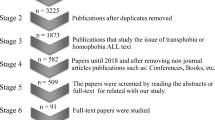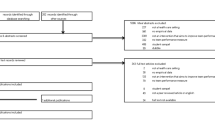Abstract
We analyse an intervention in a UK teaching hospital designed to enable ‘learning from failure’, using concepts from the Dejourian school of the psychodynamics of work. Whilst much of the English-language literature about and by Dejours focuses on his theoretical elaboration of Freud’s concepts of frustration and suffering in the context of contemporary conditions of work, this article attends to Dejours’ method of action research in workplaces. Our purpose is to consider how speech about the failures of work might be considered a basis for democratic intervention, especially in the context of simulation-based learning for professional development in healthcare.
Similar content being viewed by others
References
Bishop, V., Cassell, C.M. and Hoel, H. (2009) Preserving masculinity in service work: An exploration of the underreporting of customer anti-social behaviour. Human Relations 62(1): 5–25.
Cederstrom, C. and Hoedemakers, C. (eds.) (2010) Lacan and Organization. London: May Fly Books.
CMO (Chief Medical Officer) (2008) Safer medical practice: Machines, manikins and polo mints. Government report. London: Department of Health.
Cru, D., Guiho-Bailly, M.P. and Molinier, P. (2012) Dominique Dessors. De l’Ergonomie à la Psychodynamique du Travail: Méthodologie de l’Action. 2nd ed. Toulouse: Eres.
Dashtipour, P. (2014) Freedom through work: The psychosocial, affect and work. In: K. Kenny and M. Fotaki (eds.) The Psychosocial and Organisation Studies: Affect at Work. London: Palgrave Macmillan, pp.104–125.
Dashtipour, P. and Vidaillet, B. (2017) Work as affective experience: The contribution of Christophe Dejours’ ‘psychodynamics of work’. Organization 24(1): 18–35.
Dejours, C. (2003) L’Évaluation du Travail à l’Épreuve du Réel: Critique des Fondements de l’Évaluation. Paris: INRA editions.
Dejours, C. (2007) Subjectivity, work, and action. In: J.P. Deranty, D. Petherbridge, J. Rundell and R. Sinnerbrink (eds.) Recognition, Work, Politics: New Direction in French Critical Theory. Netherlands: Koninklijke Brill NV, pp. 71–88.
Dejours, C. (2008) Le Facteur Humain. Paris: PUF.
Dejours, C. (2009) Travail Vivant 1: Sexualité et Travail. Paris: PUF.
Dejours, C. (2012) From the psychopathology to the psychodynamics of work. In: N.H. Smith and J.P. Deranty (eds.) New Philosophies of Labour. Leiden: Brill, pp. 207–250.
Dejours C. (2013) Travail Vivant 2: Travail et Émancipation. Paris: Payot.
Dejours, C. (2015) Psychopathology of Work: Clinical Observations. London: Karnac Books.
Dejours, C. (2015a) Le Choix: Souffrir au Travail n’est pas une Fatalité. Montrouge: Bayard.
Dejours, C. (2015b) Pour une clinique de la souffrance au travail: Entretien avec Benoît Schneider. Bulletin de Psychologie 4: 285–291.
Dejours, C. (2016) La méthodologie en psychopathologie du travail. Travailler 35: 125–144.
Dejours, C. and Gernet, I. (2016) Psychopathologie du Travail. Issy-les-Moulineaux: Elsevier Masson.
Deranty, J.P. (2010) Work as transcendental experience: Implications of Dejours’ psychodynamics for contemporary social theory and philosophy. Critical Horizons 11(2): 181–220.
Deranty, J.P. (2013) Qu’est-ce que la philosophie sociale? Cahiers Philosophiques 132(1): 21–33.
Dieckmann, P. (2015) Resilience engineering and simulation. Paper presented at the SESAM (Society in Europe for Simulation Applied to Medicine) Conference, 15 June, Belfast, Ireland.
Dieckmann, P., Friis, S.M., Lippert, A. and Ostergaard, D. (2012) Goals, success factors, and barriers for simulation-based learning: A qualitative interview study in health care. Simulation & Gaming 43(5): 627–647.
Fotaki, M. (2006) Choice is yours: A psychodynamic exploration of health policymaking and its consequences for the English National Health Service. Human Relations 59(12): 1711–1744.
Freud, S. (1921/1955) Group Psychology and the Analysis of the Ego. Standard Edition 18. London: Hogarth Press, pp. 65–144.
Glynos, J. (2011) On the ideological and political significance of fantasy in the organization of work. Psychoanalysis, Culture and Society 16(4): 373–393.
Hoggett, P. (2006) Conflict, ambivalence, and the contested purpose of public organisations. Human Relations 59(2): 175–194.
Hollnagel, E. (2014) Is justice really important for safety? Hindsight 18: 10–13.
Hollnagel, E. (2015) Resilience in healthcare. Keynote paper presented at the Resilience in Healthcare Masterclass, 7 May, Guy’s Hospital, London, UK.
Hollnagel, E., Braithwaite, J. and Wears, R.L. (eds.) (2013) Resilient Health Care. Farnham: Ashgate.
Iedema, R., Jorm, C. and Lumc, M. (2009) Affect is central to patient safety: The horror stories of young anaesthetists. Social Science & Medicine 69(12): 1750–1756.
Issenberg, S.B., McGaghie, W.C., Petrusa, E.R., Gordon, D.L. and Scalese, R.J. (2005) Features and uses of high-fidelity medical simulations that lead to effective learning: A BEME systematic review. Medical Teacher 27(1): 10–28.
Molinier, P. (2006) Les Enjeux Psychiques du Travail. Paris: Payot.
Pelletier, C. and Kneebone, R. (2015) Learning safely from error: Reconsidering the ethics of simulation-based medical education through ethnography. Education and Ethnography 11(3): 267–282.
Pelletier, C. and Kneebone, R. (2016a) Playful simulations rather than serious games: Medical simulation as a cultural practice. Games and Culture 11(4): 365–389.
Pelletier, C. and Kneebone, R. (2016b) Fantasies of medical reality: An observational study of simulation-based medical education. Psychoanalysis, Culture and Society 21(2): 184–203.
Petersen, A. and Willing, R. (2013) Evaluations as a process of disenfranchisement. In: K. Keohane and A. Petersen (eds.) The Social Pathologies of Contemporary Civilization. London: Routledge, pp. 175–192.
Rudolph, J.W., Simon, R., Rivard, P., Dufresne, R. and Raemer, D. (2007) De-briefing with good judgment: Combining rigorous feedback with genuine inquiry. Anesthesiology Clinics 25(2): 362–376.
Stavrakakis, Y. (2008) Subjectivity and the organized other: Between symbolic authority and fantasmatic enjoyment. Organization Studies 29(7): 1037–1059.
Tweedie, D. and Holley, S. (2016) The subversive craft worker: Challenging ‘disutility’ theories of management control. Human Relations 69(9): 1877–1900.
Waring, J. (2009) Constructing and re-constructing narratives of patient safety. Social Science and Medicine 69(12): 1722–1731.
Woods, D. and Hollnagel, E. (2006) Resilience engineering: Concepts and precepts. http://erikhollnagel.com/onewebmedia/Prologue.pdf, accessed 15 January 2017.
Ziv, A., Wolpe, P.R., Small, S.D. and Glick, S. (2003) Simulation-based medical education: An ethical imperative. Academic Medicine 78(8): 783–788.
Conflict of interest
On behalf of all authors, the corresponding author states that there is no conflict of interest.
Author information
Authors and Affiliations
Corresponding author
Rights and permissions
About this article
Cite this article
Pelletier, C., Buchan, K. & Hall-Jackson, M. Learning from failure: Exploring the psychodynamics of work in a clinical simulation centre. Psychoanal Cult Soc 24, 72–90 (2019). https://doi.org/10.1057/s41282-018-0111-2
Published:
Issue Date:
DOI: https://doi.org/10.1057/s41282-018-0111-2




